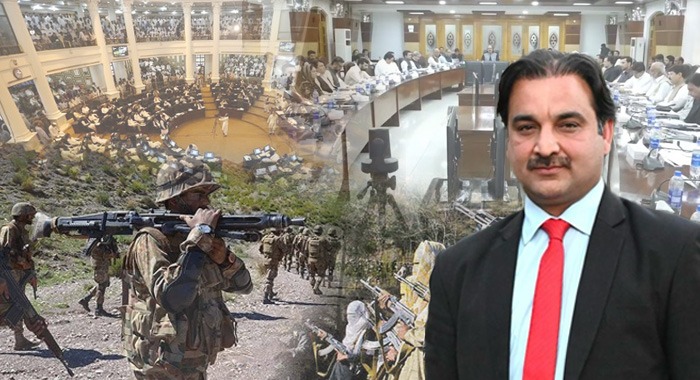The current wave of terrorism in Khyber Pakhtunkhwa (KP), particularly the escalating situation in Bajaur, has once again exposed a bitter truth: when it comes to public safety and national security, the PTI-led provincial government is failing to rise above politics.
Chief Minister Ali Amin Gandapur seems more concerned with optics than outcomes. His preference for issuing fiery statements and convening party meetings over actual policy-making highlights a dangerous trend, politics taking precedence over people. When a province is under threat from well-armed militant groups seeking to undermine the writ of the state, symbolic jirgas and political rhetoric offer no deterrence. What’s needed is decisive, coordinated, and state-backed action.
It is telling that instead of working hand-in-hand with federal security institutions, the KP government appears to be building a narrative that deliberately sows distrust between the people and the armed forces. This is not just irresponsible, it’s reckless. In a province that has historically been a front-line in the war against terror, unity between civil and military institutions is not optional; it is imperative.
If certain segments of the KP leadership, through statements or silence, display sympathies for non-state actors or question the legitimacy of security operations, they should be reminded of one thing: the Constitution of Pakistan is the supreme law. Under Article 245, it is the duty of the armed forces to assist civilian institutions in times of internal strife and terrorism. In conflict zones, where federal forces are deployed, the judiciary steps back precisely to allow swift, decisive action. These aren’t theoretical clauses; they’re safeguards for national survival.
Consider Bajaur, Tirah, and other border regions—areas that are now once again being threatened by extremists seeking to enforce their own writ. These groups do not recognize the Constitution, do not believe in democracy, and certainly do not respect civilian rights. They aim to replicate the chaos of Afghanistan on Pakistani soil. Any effort—intentional or unintentional—that undermines the state’s ability to respond is tantamount to enabling this agenda.
The military, at great cost, is carrying out operations like Sarbakaf, targeting these elements before they can entrench themselves further. Martyrs are being laid to rest, while social media influencers, party spokespersons, and even provincial leaders craft narratives that serve political ambitions more than public interest. If the provincial government truly believes in peace, why does it resist federal efforts? Why is it not strengthening its own counter-terrorism departments, CTD units, and intelligence wings?
It’s deeply unfortunate that an apex committee meeting, meant to be the central forum for cross-institutional coordination, was preceded by a PTI parliamentary party huddle. This reversal of priority underscores the provincial government’s inability to treat the security situation with the urgency and seriousness it deserves.
And what development has KP seen under this leadership? Where are the schools, the healthcare centres, the job-creating initiatives? In over a decade of power, no primary school was constructed in some areas. Bajaur, one of the most vulnerable districts, stands as a painful example of the PTI government’s negligence. Instead of investing in development and deradicalization, their leaders are busy staging protests in Lahore and Islamabad.
The truth is: if there is no country, there will be no politics. If the writ of the state is lost, there will be no elections, no assemblies, no ministries. The armed forces are not the enemy—they are the shield. And if KP’s elected leaders cannot understand this, then they are either deeply naive or dangerously complicit.
It’s time for KP’s leadership to stop playing victim and start acting like a government. They must sit with federal and military authorities to devise a joint action plan. Strengthen the CTD. Modernise intelligence-sharing. Call monthly apex committee meetings. Stop undermining the institutions that are holding the line.
The people of KP deserve peace—not posturing. And Pakistan deserves leaders who serve the state, not themselves.





